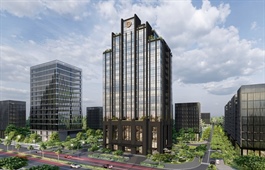Short-term rentals fear restrictions
Short-term rentals fear restrictions
Investors in Ho Chi Minh City who provide short-term apartment rental services are at risk of being fined or losing their deposits under a strict new ban.

Some apartment or homestay operators have spent thousands of US dollars on their accommodations, Photo: Shutterstock |
Ho Chi Minh City People’s Committee has banned daily and hourly accommodation rentals on apartment buildings, except for mixed-use complexes including apartments for renting to official tourists.
Decision No.26/2025/QD-UBND dated February 27 provides stricter regulations on the operation of apartment buildings which were licensed for residential only. The decision guides that for apartment buildings with the sole purpose of use for residence, the apartment rental must have a contract signed between the apartment owner and the person in need of renting, the rental purpose must be established for residence only, not for tourism renting.
With the number of apartment towers soaring in recent years in Vietnam’s biggest city, many owners lease their properties exclusively to short-term renters, having the higher yield.
According to real estate expert Tran Khanh Quang, apartments for rent on the market are currently divided into two segments. “Average qualified apartments with the prices from $80,000-120,000 per unit are not affected by this ban because this segment is suitable for long-term rental, with the yield from 4-5 per cent per year,” Quang said.
“Meanwhile, investors renting out mid- to high-end apartments, with prices from $120,000-200,000 per unit, are facing difficulties. Because this type of apartment is mainly located in the central area, short-term rental business will bring higher profits, with the yield from 5-6 per cent per year,” added Quang.
In Hanoi, where short-term rentals remain legal for now, property owners are watching closely. Many fear Ho Chi Minh City’s policies could soon extend to the capital (see below).
Le Quoc Tuan, who operates a homestay in Hanoi’s Hoan Kiem district, worries that blanket restrictions will disrupt an industry that caters to short-term travellers. “The majority of my guests stay for just two or three nights, either for leisure or business,” said Tuan. “Without that demand, sustaining our business model will be incredibly difficult.”
Long-term leasing is not a practical alternative for many homestay owners. Unlike traditional landlords, they have invested heavily in designing short-term accommodations, from high-end furnishings to curated guest experiences. The pivot to longer stays would require an entirely different business model.
The popularity of short-term services has also resulted in conflict between short-term tenants and long-term residents. According to Mai Hoang, a resident living in Gold View Buildings in District 4 of Ho Chi Minh City, short-term guests usually make more noise at night because of late arrivals, karaoke, or drinking.
“They bother us a lot, especially the older people who need more quiet time to relax, as well as others after the working day,” Hoang said.
Tran Minh Ai, senior director of Property Management for Savills in Ho Chi Minh City, commented that this decision was considered necessary to more closely manage apartment rental activities, returning the living environment to residents in apartment buildings for residential purposes only.
Ai added that in Ho Chi Minh City, many opinions have been recorded recently because the Law on Housing 2023 mentioned that apartments can only be used for living in.
“However, there are still controversies about whether short-term rentals can be called living or tourist accommodation. This new decision has clarified the information and is consistent with the provisions of the law, creating conditions for management units in supervision, while limiting the shortcomings of the short-term rental model in apartments, ensuring amenities and living environment for residents,” Ai said.
In apartment buildings in District 4, such as Icon 56, The Tresor, Milelium, Gold View, their operating boards do not allow short-term tenants to rent the apartment. This move has put many Airbnb service investors in a difficult place.
Manh Dat, director for Minh Dat Real Estate, who uses the Airbnb platform for renting, said he has been doing business in short-term rental for nearly 10 years and was renting out nearly a hundred apartments in many projects in Thu Duc city, Binh Thanh district, District 7, and Phu Nhuan district.
“Most of the apartments being operated are rented from the owners, with monthly costs ranging from $600-1,000 per month,” Dat said.
According to Dat, the short-term rentals are easier to draw in guests and generate better income than long-term rentals, with revenue from renting an apartment sometimes reaching $2,000-2,400 per month. “With the ban, we are at risk of losing thousands of US dollars each month, bearing contract termination and losing deposits from customers who have booked in advance,” Dat said.
Meanwhile, individual investor Hoang Mai said that she had spent hundreds of thousands of US dollars with bank loans to buy two apartments in District 7 to carry out Airbnb rentals. In addition, Mai also spent nearly $40,000 for furniture, design, cleaning services, repairs, and advertisements.
“The investment amount is not small, but I have not received much return before the ban. This is the family’s main source of income, used to pay the bank and normal services. If the management board requests, I will switch to long-term rental, but the profit from long-term rental is not as good, it is difficult to find customers, and I am afraid it will be difficult to recover the capital,” she said.
In addition, if short-term rentals cannot be exploited, some investors will find ways to sell their products. This increases the number of apartments on the secondary market.
Vo Hong Thang, deputy general director of DKRA Group, said that this ban would not affect tourism activities or the local economy because the market did not lack alternative products such as hotels, serviced apartments, and individual homestays.
“However, this movement will affect the liquidity of the apartment segment as well as the profits of investors. In fact, in many apartment projects that once strictly prohibited short-term stays, rental prices have subsequently decreased by 15-20 per cent,” Thang said.
|
Dinh Xuan Kien, owner, Phen Homestay Hoan Kiem district, Hanoi Currently, the majority of my homestay guests prefer short-term stays, typically between two and three days, to enjoy their travels, explore the local area, and experience a comfortable living space. This group constitutes my primary source of revenue, as is the case for many other homestay businesses. Meanwhile, demand for long-term rentals remains relatively low, as long-term tenants often opt for traditional apartments or private houses for greater stability and convenience. Therefore, if the short-term rental ban is enforced in Hanoi, I believe it will cause significant losses. It will not only directly impact my business but also negatively affect the entire homestay sector, which heavily relies on short-term travellers. Moreover, this regulation could place many homestay owners in a difficult situation, having invested significantly in renovations and furnishings but being unable to operate their businesses as intended. Restricting short-term rentals may reduce the appeal of this accommodation type, making the homestay market less vibrant and affecting the income of many individuals and businesses in the tourism and hospitality industry. Pham Van Tien, owner, The Happy Stay I have invested approximately $20,000 in renovating and furnishing my homestay apartment, covering infrastructure repairs, interior decoration, and essential furniture purchases. This investment was made with the expectation of generating a stable rental income. However, if Hanoi enforces a short-term rental ban, I anticipate a financial loss of around $800 per month. This would not only disrupt my income stream but also leave me struggling to maintain the apartment without any return on investment, ultimately affecting my ability to reinvest and ensure proper upkeep in the long run. Moreover, as I operate under a long-term lease agreement with the landlord, the ban would have even broader implications. Losing the ability to legally rent out the apartment for short-term stays means I risk forfeiting my deposit of $2,400 and being locked into an unviable contract. This situation would create significant financial strain, making it difficult to recover my initial investment while still being responsible for ongoing rental costs. To address security concerns, which are one of the main reasons behind the ban, I have already implemented strict guest screening measures. Every tenant is required to provide full personal information, and I conduct thorough security checks before allowing check-ins. Additionally, I frequently monitor the apartment’s surroundings and enforce clear regulations on guest behaviour to minimise disruptions to permanent residents. If needed, I am also open to organising safety awareness sessions for guests to further enhance security within the building. Le Viet Anh, owner, Homestay apartment Tay Ho district, Hanoi I currently rent apartments from landlords under long-term leases of one to three years, with security deposits of around $3,200 to $4,000 per unit. If the ban takes effect, I won’t be able to continue my business, leading to major financial losses. I would lose my deposits, along with the money I’ve spent on renovations and furnishings. On top of that, I might also have to pay penalties for breaking my lease agreements, making the financial hit even worse. I understand concerns about security and disturbances caused by short-term rentals and have already implemented strict measures to ensure guest quality and safety. These include verifying guest identities before check-in, installing security cameras at entry points, and restricting access to only registered guests. Moreover, I enforce strict rules on check-in times, guest capacity, and guest behaviour to minimise disturbances to permanent residents. I also work closely with building management to comply with all regulations and address any concerns from other residents. Rather than imposing a complete ban, I hope there will be a more flexible regulations that balance security concerns with business sustainability. One approach could be issuing conditional operating licences, allowing homestay businesses to operate under strict security and guest management standards. Another solution could be permitting short-term rentals within regulated timeframes to reduce disruptions in residential buildings. |
- 09:13 09/04/2025




























